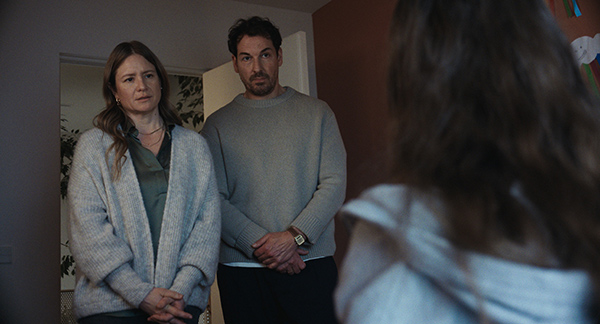The Best Little Secrets Are Kept: Hambalek’s Absurdly Skewers the Virtues of Honesty
Honesty may indeed be the best policy and maybe the truth might set us free, but context and interpretation tends to shift these proverbial policies, especially when ‘the truth’ might exist in one of those pesky grey areas. Such is the crux of Was Marielle weiß (What Marielle Knows), a surprisingly effective comedy from German director Frédéric Hambalek starring Julia Jentsch and Felix Kramer as suburban professionals whose daughter develops telepathic powers overnight. Examining established cultural mores through the lens of marital expectations, Hambalek utilizes a ridiculous scenario to reach the kind of profound truths we obscure within ourselves for the purposes of convenience.

Julia (Jentsch) and Tobias (Kramer) appear to be a moderately happy couple. At work, Julia flirts with her handsome co-worker Max (Mehmet Ateşçi) as they sneak away on cigarette breaks and exchange sexual fantasies to alleviate the boredom inherent to routine lives. Tobias, a publisher, is at odds with his annoying co-worker Soren (Moritz Treuenfels), who is more beloved by colleagues and constantly challenges him in meetings. With their teenage daughter Marielle (Laeni Geiseler) just finishing the school year, it appears something is wrong when the family sits for dinner that night. When pressed, it appears she was slapped by a schoolmate. And now, she can see and hear everything her parents do, and so she witnessed how they both behaved at work that day—something they both lie about profusely. But it appears Marielle can indeed experience everything her parents do, leading them all to confront truths they’ve been dancing around for the sake of an established bliss none of them actually experiences.

What Marielle Knows is about as tonally dissimilar to Hambalek’s first feature, Model Olimpia (2020), as one could imagine, but there are evident parallels regarding the examination of warped familial boundaries and dysfunctional attachment theories. Hambalek’s earlier film was a disturbing, ascetic portrait of a therapist mother ‘treating’ her adult son who lives with her, developing a program intended to curb her child’s supposedly aberrant sexual obsessions. However, it would appear her meddling may have the opposite effect. Hambalek’s latest feels like something we’d see in one of Quentin Dupiuex’s perennial offerings (or, something that would have starred Jim Carrey at one point in the U.S.).
Contained precisely within a tight work/life microcosm, we learn little about the withdrawn Marielle or why her schoolmate found it appropriate to call her a slut, something neither set of parents seem concerned about, agreeing only upon the inappropriateness of physical violence. And yet it’s the same scenario which plays out between Tobias and Julia considering sexual anxieties set the stage for the same kind of violence. The script’s set-up works beautifully as we observe both parents at work and their behavior with co-workers, later revised by each around the dinner table at home. Marielle’s new gift works on them in opposite ways, motivating Tobias to make his lie become the truth whilst Julia struggles to push her private experiences farther away. Arguably, secrets are sometimes only enjoyable when they can remain private.
While all of this eventually spins out of control as the confused parents try to control an uncontrollable situation (the device of them speaking French, a language their daughter doesn’t understand, is a lovely touch), it’s Julia who realizes what’s really at stake is the relationship with Marielle. Recalling the vitriol she spewed upon her own mother as a teenager, she attempts to salvage the situation knowing Marielle most likely still has her telepathic powers despite a staged and supposedly successful ‘intervention.’ And it’s here where Hambalek leaves behind the novelty of his scenario. In many ways, it’s an otherworldly premise which satisfies realistic truths, not unlike Maria Schrader’s 2021 title I’m Your Man, where Maren Eggert dives into an experimental program with a robot played by Dan Stevens. A contemporary state of surveillance eventually becomes normalized and humans find other ways to justify private desires. But forgiveness prevails despite our confrontation with the uncomfortable realities of others.
Reviewed on February 17th at the 2025 Berlin International Film Festival (75th edition) – Main Competition. 86 mins.
★★★½/☆☆☆☆☆


